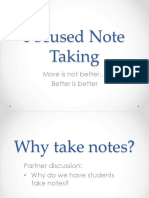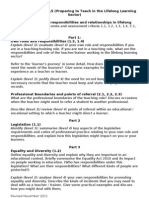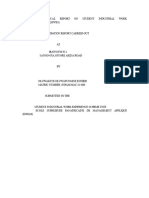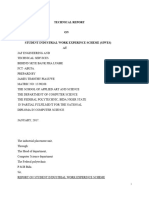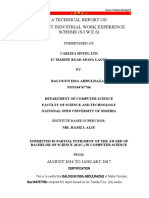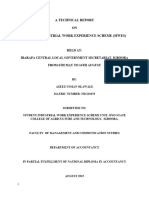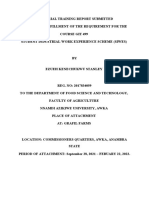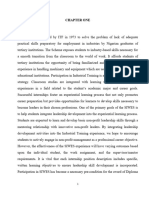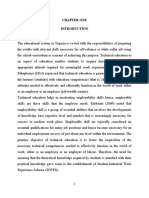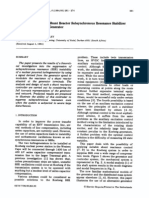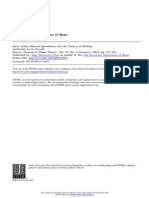Impact of Students Industrial Work Experience Scheme (Siwes) On Devellity Skills
Impact of Students Industrial Work Experience Scheme (Siwes) On Devellity Skills
Uploaded by
Eizijesu Virtue ObahaiyeCopyright:
Available Formats
Impact of Students Industrial Work Experience Scheme (Siwes) On Devellity Skills
Impact of Students Industrial Work Experience Scheme (Siwes) On Devellity Skills
Uploaded by
Eizijesu Virtue ObahaiyeOriginal Title
Copyright
Available Formats
Share this document
Did you find this document useful?
Is this content inappropriate?
Copyright:
Available Formats
Impact of Students Industrial Work Experience Scheme (Siwes) On Devellity Skills
Impact of Students Industrial Work Experience Scheme (Siwes) On Devellity Skills
Uploaded by
Eizijesu Virtue ObahaiyeCopyright:
Available Formats
See
discussions, stats, and author profiles for this publication at: http://www.researchgate.net/publication/269700426
IMPACT OF STUDENTS INDUSTRIAL WORK
EXPERIENCE SCHEME (SIWES) ON
DEVELOPMENT OF GRADUATE EMPLOYABILITY
SKILLS
ARTICLE JULY 2011
READS
2,832
1 AUTHOR:
Frederick Ukwueze
University of Nigeria
9 PUBLICATIONS 0 CITATIONS
SEE PROFILE
All in-text references underlined in blue are linked to publications on ResearchGate,
letting you access and read them immediately.
Available from: Frederick Ukwueze
Retrieved on: 24 November 2015
Nigerian Vocational Association Journal Vol. 16 (1) July 2011, pp 118-124.
IMPACT OF STUDENTS INDUSTRIAL WORK EXPERIENCE SCHEME (SIWES) ON
DEVELOPMENT OF GRADUATE EMPLOYABILITY SKILLS
BY
UKWUEZE F. N.
Department of Vocational teacher Education,
University of Nigeria Nsukka.
Email: frederick.ukwueze@unn.edu.ng
Abstract
The implementation of the students industrial work experiences (SIWES) program in
Nigerian higher institutions is aimed at empowering the students practically in relation to
their professional course of study. This paper evaluates the extent to which this program
has impacted on students viability in the job market after graduation. Three research
questions were used to guide the study on a sample of 600 students drawn from relevant
faculties of a university and a polytechnic in south eastern Nigeria. The results show that
greater level of employability skills is achievable through fruitful participation in SIWES
program.
Introduction
Growing public demand and legislative expectations for accountability in the past two decades
have made it imperative that higher education administrators and researchers pay attention to the
potential impact of student work programmes on skill development, which in turn, impacts
directly on national development objectives. Okpor and Hassan (2012) opined that if Vocational
Technical Education is to be meaningful and successful in Nigeria, then relationships are needed
between public and private sectors to partner effectively with Vocational Technical Education
and skill acquisition programmes. Students Industrial Work Experience (SIWES) is a skill
development program designed to prepare students of Nigerian tertiary institutions for transition
from the college environment to work, (Akerejola 2008). Oyedele (1990) also states that work
experience is an educational program in which students participate in work activities while
attending school. This work experience program gives students the opportunity to be part of an
actual work situation outside the classroom. The impact of Students Industrial Work Experience
(SIWES) has thus, been a cause of concern to education and economic planners, particularly with
Nigerian Vocational Association Journal Vol. 16 (1) July 2011, pp 118-124.
respect to graduate employment. There are also mixed concerns about how much of it that is
actually helpful to students academic performance and job readiness after graduation. While
some institutions and programs permit SIWES for only three months, others go for up to one
year. There has been several research literatures, in the area of student work experience and its
impact on student development of fitness for the challenges of the job market. A review of
literature reveals that, although research questions raised are quite straightforward, the answers
had been controversial. It all depends on which outcomes are measured (Furr and Elling, 2000).
For every study which postulates the benefits of students work experience, there is an equally
compelling study purporting the exact opposite (Aper, 1994).
Olugbenga (2009) carried out a survey on the views of students in the three departments of the
School of Applied Science, Nuhu Bamalli Polytechnic, Zaria about the adequacy of the skills
acquired during their participation in SIWES. From the data collected, he concluded that many
of the students suggested that the skills acquired are inadequate. This according to him was
because of the short duration and lack of modern facilities in their place of industrial training.
Ugwuanyi and Ezema (2010) noted that SIWES plays a significant role in human resource
development in Nigeria. Aderonke (2011) in her study examined SIWES and the dynamics of
sustainable skills acquisition and utilization in Nigeria with a view to determining the viability or
otherwise of government continuing investment in the scheme. She concluded that SIWES is a
good strategy for sustainable skill development and utilization in Nigeria.
Wodi and Dokubo (2009) evaluates the extent to which the agencies involved in the operation
and management of SIWES function to achieve the objectives of the programme. Lack of
adequate supervision, non signing of necessary materials like ITF Form 8 and students logbooks at their places of attachment, difficulties of students in getting placement, unnecessary
delay in the payment of students and supervisors allowance among others were areas of
weaknesses revealed. A limitation of these studies is the lack of data on job readiness of the
students as a result of the work experience.
Post-graduation career success, however, has typically been defined in terms of the likelihood of
receiving a full time job offer after graduation. This is only achievable when there is evidence of
employability skills acquisition from the programme. The present study measured the level of
relevant and necessary employability skills acquired for full time job immediately after
graduation. It is an exploratory effort to identify the impact of student industrial work experience
on their employment prospects.
A. Research Questions
This study answered the following research questions:
(1) What is the effect of Students Industrial Work Experience (SIWES) on generic, technical and
resource skills of participants
(2) What is the effect of Students Industrial Work Experience (SIWES) on personal qualities and
interpersonal skills of participants.
Nigerian Vocational Association Journal Vol. 16 (1) July 2011, pp 118-124.
Hypotheses 1
There are no significant differences between the responses of those who trained in public
institutions and their private sector counterparts with regard to the impact of SIWES.
METHOD
Design of the study
A survey research design was adopted for the study.
Area of the study
The study was conducted in University of Nigeria, Nsukka and the Institute of Management and
technology Enugu. These are first generation institutions of their kind in south eastern Nigeria.
The choice of the two categories of institutions for study was considered for understanding the
effect of the programme on both the university and polytechnic students.
Population for the study
Population for this study was 12,000, consisting of 1000 students from Agriculture, 2500
students from Engineering, 500 students from Education (VTE), all 2010 graduating students of
University of Nigeria Nsukka; and 4000 students from Engineering and technology, 1500
students from Education (technical) and 2500 students from Management Sciences from Institute
of Management and Technology Enugu. The choice of the three faculties from each of the two
schools was because they contribute the majority of the students who participate in the SIWES
programme.
Sample for study
A total of 600 students, were randomly selected for study: 100 students from each faculty in each
institution.
Instrument for data collection
Data was gathered through a descriptive survey instrument, (questionnaire). The instrument was
validated by three experts in the field. Cronbach Alpha technique was used to determine the
internal consistency of the questionnaire items using ten sample subjects. A coefficient of 0.66
was obtained.
Nigerian Vocational Association Journal Vol. 16 (1) July 2011, pp 118-124.
Data collection and analysis techniques
Three sets of survey items regarding students work skill experiences capable of enhancing
employment prospects, were presented to the students. Each item was presented with a fourpoint Likert-type response format with 1 being strongly disagree and 4 being strongly agree. In
the survey, students were asked to indicate for each item, their perception of how much of each
skill they acquired during the industrial work experience. Completed instruments were directly
collected from respondents. Data was analysed using mean and t-test statistics at 0.05 level of
significance.
RESULTS
Research Question 1:
What is the effect of Students Industrial Work Experience (SIWES) on generic, technical and
resource skills of participants?
The data needed to generate answer for this research question are presented below.
Table 1: Mean Ratings for Generic, Technical and Resource Skills
S/N
1.
2
3.
4
5
6
7
8
Skill Aspects Acquired
Reading: Locates, understands, and interprets written information in prose
and documents, including
manuals, graphs, and schedules to perform tasks,
learn from text by determining the main idea or
essential message
Writing: Communicates thoughts, ideas, information,
and messages in writing creates documents such as letters, directions,
manuals, reports, graphs and flow chart.
Mathematics/Arithmetic: performs basic computations and approaches
practical problems by choosing appropriately from a variety of
mathematical techniques.
Listening: Receives, attends to, interprets, and responds to verbal
messages and other cues such as body language in ways that are
appropriate to the purpose.
Speaking: Organizes ideas and communicates oral messages appropriate
to listeners and situations, participates in conversation, discussion, and
group
presentations.
Acquires and Evaluates Information: Identifies
need for data, obtains it from existing sources or creates it, and evaluates
its relevance and accuracy.
Uses Computers To Process Information: Employs computers to
acquire, organize, analyze
and communicate information.
Creative/Innovative Thinking
Generates new ideas, uses imagination freely, combines ideas or
information in new ways, makes connections between seemingly unrelated
ideas
and reshapes goals.
Decision Making: Specifies goals and constraints,
Mean
SD
REMARK
2.94
1.28
Agree
3.08
1.25
3.14
1.32
Agree
2.90
1.30
Agree
2.72
1.34
Agree
2.10
1.27
Disagree
3.24
1.46
Agree
3.57
3.36
1.43
1.54
Agree
Agree
Agree
Nigerian Vocational Association Journal Vol. 16 (1) July 2011, pp 118-124.
10
11
12
13
14
15
16
17
18
19
20
21
22
23
generates alternatives, considers risks and evaluates
and chooses best alternatives
Problem Solving: Recognizes that a problems,
identifies possible reasons for the discrepancy and
devices and implements a plan of action to resolve it. Evaluates and
monitors progress and revises plan as indicated by findings.
Seeing Things In The Minds Eye: Organizes and
processes symbols, pictures, graphs, objects and other information.
Knowing How To Learn: Recognizes and can use
learning techniques to apply and adapt new knowledge and skills in both
familiar and changing situations.
Reasoning: Discovers a rule or principle underlying the relationship
between two or more objects and applies it when solving a problem.
Understands System: Knows how social, organizational and
technological system work
and operates effectively within them
. Monitor and Corrects Performance: Distinguishes trends, predicts
impacts on system operations, diagnoses deviations in systems and
takes necessary action to correct performance. Creates documents such as
letters, directions, manuals, reports, graphs and flow chart.
Select Technology: Judges which set of procedures, tools or machines,
including computers and their programs will produce the desired results.
Applies Technology to Task: Understand overall
intent and proper procedures for setting up and operating machines,
including computers and their
programming.
Maintain and Troubleshoot Technology:
Prevents, identifies or solve problems in machines,
computers and other technologies.
Manages Time: Selects relevant, goal related
activities, ranks them in order of important allocates
time and prepares and follows schedules.
Manages Money: Uses or prepares budget, making
cost and revenue forecast, track budget performance and makes
appropriate adjustments.
Manages Materials and Facility Resources: Acquires stores, allocates
and distributes materials,
supplies, parts, equipment, space or final products in order to make the
best use of them.
Manages Human Resources: Assesses knowledge and skills and
distributes work accordingly, valuates performance and provides
feedback.
Manages Risks: Identifies, assesses, analyzes and
organizes risk.
3.38
1.36
Agree
2.71
1.51
Agree
2.94
1.41
Agree
3.08
1.31
Agree
3.57
1.37
Agree
3.40
1.46
Agree
3.53
1.44
Agree
3.54
1.44
Agree
3.27
1.26
Agree
1.65
1.29
Disagree
1.52
1.32
Disagree
2.80
1.26
Agree
1.80
1.29
Disagree
1.25
1.46
Agree
The data represented in table 1 above revealed that 18 out of 23 items on the levels of generic
and technical skills acquired by SIWES participants have their mean scores ranging from 2.71 to
3.57 which indicate that most of the respondents experienced positive impact of the programme.
The participants scored low on management skills, (items 19, 20, 22, 23). They also scored low
on acquisition and evaluation of information, (6).
Nigerian Vocational Association Journal Vol. 16 (1) July 2011, pp 118-124.
Research Question 2
What is the effect of Students Industrial Work Experience (SIWES) on personal qualities and
interpersonal skills of participants?
The data needed to generate answers for this research question are presented below:
Table 2: Mean Ratings for Personal Qualities and Interpersonal Skills
S/N
1
7
8
9
10
11
12
Skill Aspects Acquired
Responsibility: Exerts a high level of effort and
perseverance toward goals attainment. Work hard to become excellent at
doing tasks by setting high
standards, paying attention to details, working well and displaying a
high level of concentrations.
Self-Esteem: Believes in own self-worth and
maintains a positives view of self, demonstrates
knowledge of own skills and abilities, is aware of impact on others, and
knows own emotional capacity and needs and how to address them.
Sociability: Demonstrates understanding, friendliness, adaptability,
empathy and politeness in new and ongoing group settings. Asserts self
in familiar and unfamiliar social situations,
relates well to others and takes an interest in what
others say and do.
Self-Management: Assesses own knowledge skills and abilities
accurately, set well-defined and realistic personal goals, monitors
progress toward
goal attainment and motivates self through goal
achievement, exhibits self control and respond to
feedback unemotionally and non-defensively and is a self starter.
Integrity/Honesty: Can be trusted. Display high
standards of ethical conduct and understands the impact of violating
these standards on an organization, self and others. Is trustworthy, a
refusal to lie, steal, or mislead in any way.
Conscientiousness: Display a high level of effort and commitment
towards performing work,
demonstrates high standards of attendance, punctuality, enthusiasm,
vitality, and optimism in approaching and completing tasks.
Ability to work without supervision: Works with
minimal supervision, is motivated to achieve and
demonstrates responsible obstacles.
Work Safety: Awarenesss of personal and group health and safety
practices and procedures, and act in accordance with these.
Participates as a Member of a Team: Works
cooperatively with others and contributes to group
with ideas, suggestion and effort.
Teaches Others: Help others learn needed
knowledge and skills, identifies training need and
supplies job information to help others.
Serves Clients/Customers: Work and mmunicates
with client and customers to satisfy their expectations.
Exercises Leadership: Communicates thoughts,
feelings, and ideas to justify a position, encourages,
persuades, convinces, or otherwise motivates an
individual or groups, including responsibly
challenging existing procedures, policies or authority.
Mean
SD
REMARKS
3.25
1.76
Agree
3.88
1.87
3.62
1.10
Agree
3.74
1.96
Agree
3.23
1.09
Agree
3.08
1.14
Agree
3.92
1.18
Agree
3.47
1.13
Agree
3.72
1.13
Agree
3.41
1.14
Agree
3.55
1.03
Agree
3.65
1.11
Agree
Agree
Nigerian Vocational Association Journal Vol. 16 (1) July 2011, pp 118-124.
13
14
Negotiates: Works toward agreements that may involve exchanging
specific resources or resolving
divergent interest.
Work with Cultural Diversity: Works well with
men and women and with variety of ethnic, social or educational
backgrounds.
2.60
1.05
Agree
2.43
1.93
Agree
The data represented in table 2 above revealed that all the items on personal qualities and
interpersonal skills showed high mean scores which indicate that most of the respondents agreed
to the positive impact of the programme on their personal development.
Hypotheses 1
There are no significant differences between the responses of those who trained in public
institutions and their private sector counterparts with regard to the impact of SIWES
The data needed to prove this hypothesis was from SPSS t-test output presented below:
Table 3: t-test output
Paired Samples Statistics
Mean
Pair 1
Std. Deviation
Std. Error Mean
VAR00001
4.4922
18
1.95512
.46083
VAR00002
3.9656
18
1.95608
.46105
Paired Samples Correlations
N
Pair 1
VAR00001 & VAR00002
Correlation
18
Sig.
.709
.001
Paired Samples Test
Paired Differences
Mean
Pair 1
VAR00001 - VAR00002
.52667
Std.
Deviation
1.49183
Std. Error
Mean
.35163
95% Confidence
Interval of the
Difference
Lower
Upper
-.21520 1.26854
t
1.498
df
Sig. (2-tailed)
17
Table 3 above shows the result of a t-test conducted on the items for students who worked in
public institutions and those who worked in private establishments to find if they differ
significantly on their program experience. The result showed that those in public institutions had
.153
Nigerian Vocational Association Journal Vol. 16 (1) July 2011, pp 118-124.
a higher average score than those who served in private institutions (public: M=4.49, SD=1.96;
private: M=3.97, SD=1.96); t (17) =1.5, p>.05. Thus, while indicating the extent to which they
have gained a list of skills through involvement in SIWES, those who were posted to public
institutions reported more positive gains than those posted to private sector organizations.
DISCUSSION
Based on the analysis of the data above certain findings were made.
Research question one deals with the level of generic and technical skills received by the SIWES
participants. The data given in Table 1 show that very few students failed to acquire practical
work experience in the area of general resource management (time, money, human resources and
risks). They also failed to grasp the technique of acquiring and evaluating necessary and relevant
information as part of their business ventures in industrial trainings. Much of the available
literature is supported by this result. Aderonke (2011), reiterated the submission of the
Manpower Service Commission (1981) which described training, as a planned process to modify
attitude, knowledge or skill behaviour through learning experience to achieve effective
performance in the activity or range of activities. Its purpose, in the work situation and future
expectation, is to develop the abilities of the individual and so satisfy the current and future
manpower needs of the organization and the society. The author further stated that students who
undertake SIWES programmes are therefore better exposed to new technological or technical
skills. This finding is also supported by Cole (1997) that training in skills is related to exposure
to job challenges and competence level of the job holder.
Research question 2 focused on SIWES participants social and personal development
experience. They showed general improvement in critical thinking skills, and in their interactions
with different groups, and various communities, of workers. This confirms Curtiss and
Nimmers (1991) assertion that Jobs provide discipline and structure, along with extra income,
to the lives of newly independent college freshmen and may even provide a positive influence on
study habits, by forcing students to more carefully budget their free time. The findings also
support (Kuh 1995) that work, among other out-of-class activities, has presented students with
personal and social challenges, encouraged them to develop more complicated views on
personal, academic, and other matters.
The finding from the hypothesis reveal that students who worked in public institutions
showed a significant difference in their gains in skills and experience through work from those
who worked in private institutions. The result leads to rejection of the null hypotheses. The
observed difference resulted from the fact that public enterprises are better structured particularly
in staff development matters and also because they possess better facilities and enabling
environment for staff training and development.
Nigerian Vocational Association Journal Vol. 16 (1) July 2011, pp 118-124.
Conclusion
In summary, this study adds to previous research that suggests that undergraduate work
experience in general and SIWES programme in particular, has a positive impact on a students
early career success. The study shows that those who serve in government establishment,
inclusive of organized private sector, are exposed to better opportunity for developing
employability skills than those in private organizations.
Recommendations
The findings of this study lead to the following recommendations:
1. Government should strengthen the SIWES scheme through adequate funding.
This will enable proper remuneration of supervising staff from government departments
and institutions of learning.
2. Uniform programs for trainees should be developed for various trades in various
disciplines in accordance with the National Occupational Standards being developed by
the NBTE.
3. Legislative procedures should be undertaken which provides for for mandatory
acquisition of relevant facilities for training of participants, particularly by the private
sector organizations.
4. Tax relief and other incentives should be granted to private sector organizations who
implement the programme satisfactorily.
REFERENCES
Aderonke Agnes Oyeniyi (2011), Students Industrial Work Experience and the Dynamics of
Sustainable Skills Acquisition and Utilization among Graduates in Nigeria Research
Journal of Internatonal Studes - Issue 19 (June., 2011) pp130-136
Akerejola, R. 2004. Information for Students Industrial Work Experience Scheme. Jos: ITF.
Aper, J. P. (1994). An investigation of the relationship between student work experience and
student outcomes. Paper presented at the Annual Meeting of the American Educational
Research Association, New Orleans, LA (ERIC Document Reproduction Service No.
ED375750).
Cole G. A. (1997) Personnel Management Theory and Practice (4th Ed.), London Letts
Educational.
Curtis, G. and Nimmer, C. E. (1991). To work or not to work: That is the question. Journal of
Student Financial Aid, 21(3), 16-26.
Furr, S. and Elling, T. W. (2000). The influence of work on college student development. NASPA
Journal, 37(2), 454-470.
Nigerian Vocational Association Journal Vol. 16 (1) July 2011, pp 118-124.
Kuh, G. D. (1995). The other curriculum: Out-of-class experiences associated with student
learning and personal development. Journal of Higher Education, 66(2), 123-155.
Okpor, Ikechukwu, Hassan Najimu (2012) Public-Private Partnership for Skill Acquisition and
Vocational Technical Education Development in Nigeria Mediterranean Journal of Social
Sciences Vol. 3 (4) January 2012 pp91-94
Olugbenga, A.F. 2009. Towards Effective SIWES Curriculum Development in Applied
Sciences for Adequate Skills Utilization: A Case Study of the School of Applied Science,
Nuhu Bamalli Polytechnic, Zaria. Pacific Journal of Science and Technology.
10(1):234-239.
Oyedele, J.P. (1990). Co-operative work experience programme for youths in business
education. Business Education Journals 2 : 30-53.
Ugwuanyi C. F; Ezema J. U. (2010), Challenges of Students Industrial Work Experience
Scheme (SIWES) in Library and Information Science in the ICT Environment. Library
Philosophy and Practice July 2010. Accessed on 10th September 2011, from:
http://www.thefreelibrary.com/Library+Philosophy+and+Practice/2010/July/1-p52045
Wodi, S. W. and Dokubo. A (2009); Appraisal of Students Industrial Work Experience Scheme
(SIWES) in five Tertiary Institutions in Rivers State Nigeria: European Journal of Social
Sciences Vol. 7 No 3.
.
You might also like
- Design and Implementation of Allocation of Supervisors To Siwes StudentDocument7 pagesDesign and Implementation of Allocation of Supervisors To Siwes Studentsanusi bello bakura0% (1)
- Influence of Students' Industrial Work Experience Scheme On Business Education Students Skills Acquisition in University of BeninDocument8 pagesInfluence of Students' Industrial Work Experience Scheme On Business Education Students Skills Acquisition in University of Beninoluwafemi Matthew100% (1)
- MY IT REPORT For Secondary SchoolDocument7 pagesMY IT REPORT For Secondary SchoolUgoStanNo ratings yet
- Siwes Technical Report: SEPTEMBER, 2016Document55 pagesSiwes Technical Report: SEPTEMBER, 2016AugustineNo ratings yet
- The Root Cause Analysis Process Should Follow These 7 StepsDocument5 pagesThe Root Cause Analysis Process Should Follow These 7 StepsFaisal AbbasNo ratings yet
- I Ching and Big DataDocument13 pagesI Ching and Big Datamjcarri100% (1)
- Escobar 1996 Construction Nature. Elements For A Postestructuralist Political EcologyDocument19 pagesEscobar 1996 Construction Nature. Elements For A Postestructuralist Political EcologyJessica ArgüelloNo ratings yet
- Focused Note TakingDocument29 pagesFocused Note Takingboaz selka100% (2)
- Revised New PTLLS Assignment 1 Levels 3 and 4 Nov 2011Document3 pagesRevised New PTLLS Assignment 1 Levels 3 and 4 Nov 2011dave_perry189218No ratings yet
- Concept of SiwesDocument9 pagesConcept of Siwesoluwafemi MatthewNo ratings yet
- Report 7Document13 pagesReport 7muhammadthannisaliu81No ratings yet
- History of Siwes IIDocument15 pagesHistory of Siwes IIAdejumo Irmma Adewale100% (2)
- Lecture Nsche Engr Mafe SIWESDocument38 pagesLecture Nsche Engr Mafe SIWESoluomo1No ratings yet
- Siwes Report On Cyber CafeDocument20 pagesSiwes Report On Cyber CafealliramdulNo ratings yet
- Challenges of Emerging Office Technologies and Initiatives of Secretaries of Business Organisations in Lagos StateDocument108 pagesChallenges of Emerging Office Technologies and Initiatives of Secretaries of Business Organisations in Lagos StateChiemerie Henry NwankwoNo ratings yet
- TECHNICAL REPORT - AyeniDocument13 pagesTECHNICAL REPORT - AyeniAdemola OmolaraNo ratings yet
- Siwes Report On NpaDocument45 pagesSiwes Report On Npaalozie alexanderNo ratings yet
- Challenges of Applying Forensic Accounting Today in NigeriaDocument10 pagesChallenges of Applying Forensic Accounting Today in NigeriatayoNo ratings yet
- TECHNICAL REPORT ON STUDENT INDUSTRIAL WORK EXPERIENCE Akintan CollinsDocument30 pagesTECHNICAL REPORT ON STUDENT INDUSTRIAL WORK EXPERIENCE Akintan CollinsAdekayero MichaelNo ratings yet
- SIWES Report PDFDocument50 pagesSIWES Report PDFVictor AniekanNo ratings yet
- Brief On Nigerian Film CorporationDocument4 pagesBrief On Nigerian Film CorporationHabib SalehNo ratings yet
- Armachi Imt ReportDocument38 pagesArmachi Imt ReportErhueh Kester AghoghoNo ratings yet
- Siwes Project Report - 035932Document18 pagesSiwes Project Report - 035932Samuel Oluwaseun OlatunjiNo ratings yet
- REPORTDocument20 pagesREPORTTobiloba SalakoNo ratings yet
- A Report of Six Months Industrial TrainingDocument37 pagesA Report of Six Months Industrial TrainingAdeyeye davidNo ratings yet
- Student Industrial Work ExperienceDocument19 pagesStudent Industrial Work ExperienceTobiloba SalakoNo ratings yet
- I.T ReportDocument42 pagesI.T ReportDaniel DeborahNo ratings yet
- Data Center Engineering Certificate ProgramDocument2 pagesData Center Engineering Certificate Programherden84No ratings yet
- A Technical Report On Student Industrial Work Experience SCHEME (S.I.W.E.S)Document31 pagesA Technical Report On Student Industrial Work Experience SCHEME (S.I.W.E.S)Prince Emmanuel NwatuborNo ratings yet
- Siwes Report KamilahDocument28 pagesSiwes Report KamilahAbdulwasiu Abubakar Little WayneNo ratings yet
- Main Chapters of IT ReportDocument55 pagesMain Chapters of IT ReportJOYCE ONYEAGORONo ratings yet
- Technical ReportDocument13 pagesTechnical ReportAli Abdullahi Jr.No ratings yet
- This Siwes Report Is Dedicated To God Almighty Who Made It A Success, To My Parents For Their Financial and Above All Spiritual SupportDocument33 pagesThis Siwes Report Is Dedicated To God Almighty Who Made It A Success, To My Parents For Their Financial and Above All Spiritual SupportElujekwute BenjaminNo ratings yet
- Adekunle Benjamin Siwes Report On DSTVDocument11 pagesAdekunle Benjamin Siwes Report On DSTVBello OlalekanNo ratings yet
- Electronic LogbookDocument65 pagesElectronic LogbookjethroNo ratings yet
- Siwes - Report - Guide 2024 CompiledDocument15 pagesSiwes - Report - Guide 2024 CompiledBarka Tumba NgiddaNo ratings yet
- Alamu Olawale Ahmed SIWES Technical ReportDocument30 pagesAlamu Olawale Ahmed SIWES Technical ReportLaguda Adeyemi0% (1)
- Principle of ManagementDocument20 pagesPrinciple of ManagementTobiloba Salako100% (1)
- Causes of Mass Failure in Senior School Certificate Mathematics ExaminationsDocument11 pagesCauses of Mass Failure in Senior School Certificate Mathematics ExaminationsAlexander DeckerNo ratings yet
- Siwes ReportDocument14 pagesSiwes ReportADIGUN GodwinNo ratings yet
- Azeez Usman Olawale Finance Dept LGAs Body of ReportDocument24 pagesAzeez Usman Olawale Finance Dept LGAs Body of ReportOsunsola Seyi philipNo ratings yet
- Siwes HaddyDocument48 pagesSiwes Haddykotilodamola32No ratings yet
- Faculty of Science, University of Ibadan, Nigeria. CSC 399 Industrial TrainingDocument44 pagesFaculty of Science, University of Ibadan, Nigeria. CSC 399 Industrial Trainingodekunle oluwatobi alao100% (1)
- Industrial Training ReportDocument28 pagesIndustrial Training ReportIdowu OjoNo ratings yet
- Impact of Training On Employees Performance in Manufacturing IndustriesDocument45 pagesImpact of Training On Employees Performance in Manufacturing IndustriesABDULRAZAQNo ratings yet
- DaggykiddDocument19 pagesDaggykiddDaggy KiddNo ratings yet
- Pco Sweies 300level 123Document37 pagesPco Sweies 300level 123Ugo UmeojiakuNo ratings yet
- Siwes ReportDocument18 pagesSiwes ReportEmmanuel GeorgeNo ratings yet
- A Siwes ReportsDocument32 pagesA Siwes ReportsYAKUBU JOY ALLUNo ratings yet
- 1.1 Background of The StudyDocument31 pages1.1 Background of The StudyChinwuba Samuel EbukaNo ratings yet
- Report of Student Industrial Work Experience Scheme (Siwes) Training ProgrammeDocument45 pagesReport of Student Industrial Work Experience Scheme (Siwes) Training ProgrammeAdefila Sunday DadaNo ratings yet
- Influence of Project Risk Management Practices On Performance of Telecommunication Network Modernisation Projects in KenyaDocument25 pagesInfluence of Project Risk Management Practices On Performance of Telecommunication Network Modernisation Projects in KenyaAjit Pal SinghNo ratings yet
- Kenechukwu WorkDocument43 pagesKenechukwu WorkConstance Obk KonnieyNo ratings yet
- Korave Ushahemba Dickson's SIWESDocument18 pagesKorave Ushahemba Dickson's SIWESPaul100% (1)
- SIWES ReportDocument13 pagesSIWES ReportAli Abdullahi Jr.No ratings yet
- Impacts of Computers On Todays SocietyDocument6 pagesImpacts of Computers On Todays Societyما ري ياهNo ratings yet
- Siwes ReportDocument26 pagesSiwes ReportdavidgrcaemichaelNo ratings yet
- Siwes Report Format GuideDocument6 pagesSiwes Report Format GuideidrisshehuinuwaNo ratings yet
- Siwes Fed Poly EdeDocument30 pagesSiwes Fed Poly EdeAkanfeNo ratings yet
- The Activities Carried Out During The Siwes PeriodDocument32 pagesThe Activities Carried Out During The Siwes Periodpekkep100% (2)
- Website Development of Crime Management System: January 2022Document35 pagesWebsite Development of Crime Management System: January 2022sana ullah0% (1)
- EmDocument29 pagesEmJames MurphyNo ratings yet
- Report On LinuxDocument15 pagesReport On Linuxgangana nikhithreddyNo ratings yet
- Buchi Siwes Report - AsdDocument26 pagesBuchi Siwes Report - AsdOnyebuchi OkekeNo ratings yet
- Significance of Student Industrial Work Experience SchemeDocument36 pagesSignificance of Student Industrial Work Experience SchemeADEOYE JAMES0% (1)
- Pathway To ProsperityDocument34 pagesPathway To Prosperityzurr28100% (2)
- YdseDocument3 pagesYdseSunil SinghNo ratings yet
- Theoretical Study of A Shunt Reactor Sub Synchronous Resonance StabilizerDocument14 pagesTheoretical Study of A Shunt Reactor Sub Synchronous Resonance StabilizerFranck Mofati KasangalaNo ratings yet
- Thesis HRM For Startups PDFDocument84 pagesThesis HRM For Startups PDFlaela qodaryahNo ratings yet
- Michael E. O'Reilly - Commentary On T.S. Eliot's Poem, Gerontion PDFDocument4 pagesMichael E. O'Reilly - Commentary On T.S. Eliot's Poem, Gerontion PDFHiranmay RoyNo ratings yet
- Comprehension PassageDocument4 pagesComprehension Passagetashadat100% (2)
- Flame Tests, Atomic Spectra & Applications Activity C12!2!02 & 03Document11 pagesFlame Tests, Atomic Spectra & Applications Activity C12!2!02 & 03Nurul Hana OmarNo ratings yet
- RIS3 GuideDocument122 pagesRIS3 Guideomargtx2No ratings yet
- The Korean Wave (Hallyu) in East Asia A Comparison of Chinese, Japanese, and Taiwanese Audiences Who Watch Korean TV Dramas ) JONGHOE YANGDocument46 pagesThe Korean Wave (Hallyu) in East Asia A Comparison of Chinese, Japanese, and Taiwanese Audiences Who Watch Korean TV Dramas ) JONGHOE YANGVibhav SinghNo ratings yet
- HR Unmovable Team March 15 Draft2Document5 pagesHR Unmovable Team March 15 Draft2AnthonyTiu0% (1)
- Psycho PhiloDocument7 pagesPsycho PhiloInsekto BitesNo ratings yet
- B2 TudelaDocument9 pagesB2 TudelaInma Muñoz GarcésNo ratings yet
- "Logicomix" An Epic Search For TruthDocument2 pages"Logicomix" An Epic Search For TruthanthsofianNo ratings yet
- Early Indian Musical Speculation and The Theory of Melody - Rowell, L.Document29 pagesEarly Indian Musical Speculation and The Theory of Melody - Rowell, L.Langravio Faustomaria Panattoni100% (1)
- Break Free Video 4 ChecklistDocument4 pagesBreak Free Video 4 Checklistmk9009No ratings yet
- 7 Pillars of ChristianityDocument33 pages7 Pillars of ChristianityRev. Dr Jeffry David CammNo ratings yet
- The Research ProblemDocument6 pagesThe Research Problemsheebakbs5144No ratings yet
- Assignment 1 1aDocument10 pagesAssignment 1 1aapi-295073409No ratings yet
- Principles On How To Interpret The MoonDocument2 pagesPrinciples On How To Interpret The MoonAstroSunil100% (1)
- 1 ArticleDocument3 pages1 Articleapi-277929152No ratings yet
- Fuzzy Differential Evolution AlgorithmDocument118 pagesFuzzy Differential Evolution AlgorithmSakthivelan RamachandranNo ratings yet
- Diss-Module 10-11Document10 pagesDiss-Module 10-11Eleazar De TorresNo ratings yet
- Win LottoDocument16 pagesWin Lottosandeep1166150% (2)
- Romans 4 17 25 How Can I Accomplish God S Will in My LifeDocument2 pagesRomans 4 17 25 How Can I Accomplish God S Will in My LifeCabagnot Piolo JuliusNo ratings yet
- Ajol File Journals - 549 - Articles - 122514 - Submission - Proof - 122514 6469 336146 1 10 20150922Document20 pagesAjol File Journals - 549 - Articles - 122514 - Submission - Proof - 122514 6469 336146 1 10 20150922abiolaooNo ratings yet







